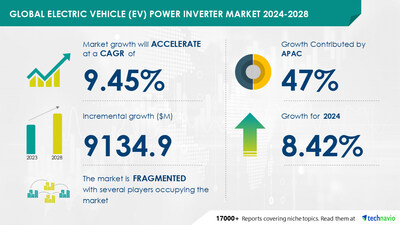NEW YORK, Aug. 23, 2024 /PRNewswire/ — The global electric vehicle (EV) power inverter market size is estimated to grow by USD 9.13 billion from 2024-2028, according to Technavio. The market is estimated to grow at a CAGR of over 9.45% during the forecast period. Increasing sales of bevs and phevs is driving market growth, with a trend towards in-wheel micro-inverter system. However, thermal management issues limiting the performance of evs poses a challenge. Key market players include Aegis Power Systems Inc., Aptiv Plc, BorgWarner Inc., Bosch Mobility Solutions, Continental AG, Danfoss AS, DENSO Corp., Fuji Electric Co. Ltd., Hitachi Ltd., Hyundai Mobis Co. Ltd., Infineon Technologies AG, LG Magna e Powertrain, MAHLE GmbH, Marelli Holdings Co. Ltd., Meidensha Corp., Metric Mind Engineering, Mitsubishi Electric Corp., Siemens AG, Toyota Industries Corp., and Valeo SA.
Get a detailed analysis on regions, market segments, customer landscape, and companies – Click for the snapshot of this report
|
Forecast period |
2024-2028 |
|
Base Year |
2023 |
|
Historic Data |
2018 – 2022 |
|
Segment Covered |
Application (Full hybrids, Pure EV, Plug-in hybrids, Commercial HEV, and Mild hybrids), Type (Passenger cars and Commercial vehicles), and Geography (APAC, Europe, North America, South America, and Middle East and Africa) |
|
Region Covered |
APAC, Europe, North America, South America, and Middle East and Africa |
|
Key companies profiled |
Aegis Power Systems Inc., Aptiv Plc, BorgWarner Inc., Bosch Mobility Solutions, Continental AG, Danfoss AS, DENSO Corp., Fuji Electric Co. Ltd., Hitachi Ltd., Hyundai Mobis Co. Ltd., Infineon Technologies AG, LG Magna e Powertrain, MAHLE GmbH, Marelli Holdings Co. Ltd., Meidensha Corp., Metric Mind Engineering, Mitsubishi Electric Corp., Siemens AG, Toyota Industries Corp., and Valeo SA |
The Electric Vehicle (EV) market is witnessing an emerging trend towards in-wheel motors, where motors are installed next to the wheel in parallel. This design offers several advantages, including increased space for battery packs and luggage due to the reduced size of the motor and inverter. However, the size of the inverter is crucial to maintaining this advantage. Protean Electric is leading this innovation with their inside-out motor and micro-inverter system. The micro-inverter system is installed within the motor itself, using the space between the external rotor and internal stator. Several micro-inverters are used to break down high current at high voltage into small currents at small voltages. This redundancy feature ensures that if one micro-inverter fails, the motor continues to function with reduced performance, minimizing the impact on the overall system. The demand for such micro-inverter systems in EV power inverters is expected to grow during the forecast period, providing reliability and efficiency to the EV market.
The Electric Vehicle (EV) power inverter market is witnessing significant trends, with SiC inverters gaining popularity due to their efficiency and high power density. The electric breaking field is another trend, enabling regenerative braking and improving overall vehicle performance. Cooling coefficients are essential for managing the heat generated by these inverters, especially in used EVs. Hybrid Electric Vehicles (HEVs) and Battery Electric Vehicles (BEVs) require different inverter types, such as CV-specific electric motors for HEVs and traction inverters for BEVs. SiC inverters, like those from Hyundai and Vitesco, are increasingly used due to their wide-bandgap semiconductors, such as SiC and GaN. 800-volt inverters and DC battery voltages are becoming standard for EVs, enabling faster charging and higher efficiency. Multiphase AC current, gate drivers, and current and position measurements are crucial components of these inverters, requiring mathematical transformations for output signals. Power electronics, sustainable transportation solutions, and environmental initiatives are driving the demand for cleaner energy sources. Power inverter manufacturers are investing in charging infrastructure networks to support the growing number of emission-free vehicles. Soft switching inverters and wide-bandgap semiconductors are key technologies shaping the future of the EV power inverter market.
Discover a Comprehensive 360° Market Analysis: Understand the Impact of AI. For detailed information- Request Sample!
• Electric Vehicle (EV) power inverters play a crucial role in converting DC battery power into AC power for the vehicle’s electrical systems. However, the increased use of electronic units in EVs generates more heat compared to conventional vehicles. Quick acceleration demands more power, leading to increased heat dissipation of around 250W per power device. To maintain the temperature below 125 degrees Celsius, cooling systems are necessary. Traditional methods, such as heat spreaders and thermal grease, create high thermal resistance, reducing system efficiency. Current systems use water-ethylene glycol coolant circulation, but it consumes more space, making the modules complicated, heavy, and expensive. New technologies like two-sided cooling systems and shared cooling architectures offer solutions, but they increase the cost of the power inverter system. Effective thermal management is essential to ensure the longevity and efficiency of EV power inverters.
• The Electric Vehicle (EV) power inverter market is experiencing significant growth due to the increasing demand for sustainable transportation solutions and environmental initiatives. Power electronics, including SiC (silicon carbide) and GaN (gallium nitride) semiconductors, play a crucial role in the development of efficient EV power inverters. Traction inverters, such as soft switching inverters, are essential components of automotive traction systems, enabling emission-free vehicles to function. Power inverter manufacturers face challenges in meeting the demands of charging infrastructure networks and consumer behavior. The adoption of wide-bandgap semiconductors, like SiC and GaN, can help improve switching frequencies, reduce energy losses, and increase driving range. Automobile manufacturers, including General Motors, are investing in energy-efficient EV technology to meet emission standards and reduce greenhouse gases. However, challenges remain, such as semiconductor supply, operating costs, and charging infrastructure development. Consumer spending on green vehicles is on the rise, and technological development in battery technology and power inverters continues to advance. Companies like NXP Semiconductors and VEPCO Technologies are leading the way with innovative inverter prototypes, such as SIL-D-capable inverters. Mitsubishi and other automakers are focusing on weight reduction to improve EV performance and competitiveness with internal combustion engines.
For more insights on driver and challenges – Download a Sample Report
This electric vehicle (ev) power inverter market report extensively covers market segmentation by
- Application
- 1.1 Full hybrids
- 1.2 Pure EV
- 1.3 Plug-in hybrids
- 1.4 Commercial HEV
- 1.5 Mild hybrids
- Type
- 2.1 Passenger cars
- 2.2 Commercial vehicles
- Geography
- 3.1 APAC
- 3.2 Europe
- 3.3 North America
- 3.4 South America
- 3.5 Middle East and Africa
1.1 Full hybrids- The Electric Vehicle (EV) power inverter market is experiencing significant growth due to increasing demand for cleaner and more sustainable transportation solutions. These inverters convert DC battery power into AC power, enabling EVs to operate on electricity. Major automakers and new entrants are investing heavily in this technology to meet stringent emission norms and customer preferences. The market is expected to expand at a robust CAGR through 2026. Key players include Tesla, Continental AG, and Magna International.
For more information on market segmentation with geographical analysis including forecast (2024-2028) and historic data (2018 – 2022) – Download a Sample Report
The Electric Vehicle (EV) power inverter market is experiencing significant growth due to the increasing demand for sustainable transportation solutions and environmental initiatives. As more countries adopt stricter emission standards, the shift towards cleaner energy sources in the automotive industry is accelerating. Power electronics, specifically SiC (silicon carbide) and GaN (gallium nitride) power inverters, play a crucial role in the efficient conversion of DC power from the battery to AC power for the electric motor in EVs. The market is driven by the growing popularity of electric and hybrid vehicles among consumers, with automobile manufacturers such as General Motors investing heavily in energy efficiency and reducing greenhouse gas emissions. The development of charging infrastructure networks is also a key factor, as is the ongoing technological advancements in power inverters, leading to increased energy efficiency and lower operating costs. Consumer spending on green vehicles is expected to continue growing, making the EV power inverter market an attractive investment opportunity for manufacturers like NXP Semiconductors and VEPCO Technologies, who are developing SIL-D-capable inverters and innovative inverter prototypes to meet the demands of this rapidly evolving market.
The Electric Vehicle (EV) power inverter market is witnessing significant growth due to the increasing demand for sustainable transportation solutions and environmental initiatives. Power electronics, including SiC (silicon carbide) and GaN (gallium nitride) semiconductors, play a crucial role in the development of EV power inverters. These wide-bandgap semiconductors enable higher switching frequencies, leading to energy savings and improved driving range. Traction inverters, including soft switching inverters, are essential components of automotive traction systems, converting DC battery voltage to multiphase AC current for the electric motor. EV power inverters are integral to emission-free vehicles, including passenger cars, hybrid vehicles, and battery electric vehicles. Automobile manufacturers like General Motors, Hyundai, Mitsubishi, and others are investing in energy efficiency and reducing greenhouse gases by integrating these inverters into their vehicles. Charging infrastructure networks, including charging stations, are also crucial to the adoption of EVs, influencing consumer behavior and semiconductor supply. Operating costs, tailpipe emissions, and cooling coefficients are essential factors in the development of EV power inverters. Companies like NXP Semiconductors and VEPCO Technologies are leading the way with innovative inverter prototypes, including SIL-D-capable designs, to meet the demands of the EV market. Consumer spending on green vehicles and technological development continue to drive growth in the EV power inverter market. Weight reduction, electric braking fields, and SiC inverters are also areas of focus in the EV power inverter market, with companies like Hyundai and Vitesco investing in these technologies. The use of 800-volt inverters and DC battery voltage is becoming more common in the EV market, requiring gate drivers, AC voltage, current measurements, position measurement, and mathematical transformations for optimal performance.
1 Executive Summary
2 Market Landscape
3 Market Sizing
4 Historic Market Size
5 Five Forces Analysis
6 Market Segmentation
- Application
- Full Hybrids
- Pure EV
- Plug-in Hybrids
- Commercial HEV
- Mild Hybrids
- Type
- Passenger Cars
- Commercial Vehicles
- Geography
- APAC
- Europe
- North America
- South America
- Middle East And Africa
7 Customer Landscape
8 Geographic Landscape
9 Drivers, Challenges, and Trends
10 Company Landscape
11 Company Analysis
12 Appendix
Technavio is a leading global technology research and advisory company. Their research and analysis focuses on emerging market trends and provides actionable insights to help businesses identify market opportunities and develop effective strategies to optimize their market positions.
With over 500 specialized analysts, Technavio’s report library consists of more than 17,000 reports and counting, covering 800 technologies, spanning across 50 countries. Their client base consists of enterprises of all sizes, including more than 100 Fortune 500 companies. This growing client base relies on Technavio’s comprehensive coverage, extensive research, and actionable market insights to identify opportunities in existing and potential markets and assess their competitive positions within changing market scenarios.
Technavio Research
Jesse Maida
Media & Marketing Executive
US: +1 844 364 1100
UK: +44 203 893 3200
Email: media@technavio.com
Website: www.technavio.com/
![]() View original content to download multimedia:https://www.prnewswire.com/news-releases/electric-vehicle-power-inverter-market-to-expand-by-usd-9-1-billio-2024-2028-driven-by-bev-and-phev-sales-growth-ai-impact-on-trends–technavio-report-302229386.html
View original content to download multimedia:https://www.prnewswire.com/news-releases/electric-vehicle-power-inverter-market-to-expand-by-usd-9-1-billio-2024-2028-driven-by-bev-and-phev-sales-growth-ai-impact-on-trends–technavio-report-302229386.html
SOURCE Technavio

Featured Image: Megapixl @ Vencavolrab





